- Home
- Nevil Shute
Most Secret Page 4
Most Secret Read online
Page 4
Duchene passed a weary hand across his eyes.
“One must go on working for the present,” said the younger man.
M. le directeur said: “I have been thinking over what you said the other day, about the runways at the aerodrome at Caen. Each ton we send out is a blow at England, and although I do not like the English, at any rate they are still fighting in a way against these German swine. How do you feel about that, Simon?”
“I do not like it, monsieur.”
“I do not like it either. The English are still fighting in their way against these filthy murderers, and you and I are fighting in our way against the English. Does that make sense to you—you who are an Englishman yourself? Hey? Does that make sense?”
“No, monsieur. It does not make sense. But there is nothing we can do about it.”
Duchene sat brooding for a time, in silence. “I would rather that the factory had been blown up and stood in ruins than that it should be used like this.”
“That is what we should have done,” said the designer. “It is too late now, but we should have blown it up ourselves, before the Germans came.”
The old man stared at him. “Who could have guessed these Germans were not people like ourselves?”
“We were told often enough,” said Simon grimly. “All the world told us that the Germans were a murderous and an uncivilised people, without decent codes of conduct. But when they conquered us, we thought they would be people like ourselves.”
There was a long silence. When Duchene spoke again his voice had lost all its vigour; he spoke as a very tired old man.
“I do not know what happened to France,” he said wearily. “I have been thinking and thinking, and I cannot understand. We knew that the Germans were like this in the old days—we knew it, and we fought them with the British as our allies, and we beat them down. And then we lost our faith.…”
He stared at the designer with tired eyes. “It is as if all France had lain under a spell,” he said slowly. “From that place at Berchtesgarten there has spread an influence, malign, like a miasma, that has sapped our will. So that we laid down our arms, and never fought at all, and so became mere tools for evil in the hands of evil men.…”
He got up wearily from his chair, swaying a little as he stood. “One thing alone saved the English from our lot,” he muttered, half to himself. “Running water—twenty miles of it, salt running water of the sea. That is why the English are still brave to fight, as we were once. No spell, no sucking weakening influence sent out by evil people can cross running water. When I lived in the country as a boy, everybody knew that much.”
Presently Simon got him downstairs to the car. He took him to the appartement and gave the old man over to his housekeeper, before he went on to the station in the car to meet the Germans coming down from Paris on the midday train.
At that time there was construction work of every description going on along the whole length of the Channel coastline of France. The little watering-place of Le Tréport, amongst others, was undergoing a radical reorganisation of its harbour under German supervision, with a view to making it more suitable for barge traffic. A fortnight later, Simon was summoned to a conference at Le Tréport, to deal with certain engineering problems at that port and at Saint-Valery-sur-Somme.
It was not the first time that the Germans had used him in this way; indeed, the vast extent of their conquests made it necessary for them to use technicians from the countries they had overrun. Simon went with mixed feelings. He disliked open work on military matters; it did not seem so bad when one was working in the office at Corbeil, when he could forget the use to which the product would be put. On the other hand, the trip to the sea coast was a change and something of a holiday; he could spin it out over three days.
He went on a Tuesday in late October, and spent the first afternoon walking round the watering-place and studying the little docks. Wednesday was spent with the Germans. They made a quick tour of the harbour in the morning, then settled to a conference on material supplies. They finished about four o’clock.
Gathering together his papers, the German chairman of the conference said to Simon: “You are going back to-night?”
The designer shrugged his shoulders. “I will go to the station and find out about the trains. I do not think I can get through to Corbeil to-night, and it is cheaper to stay here than in Paris. I shall only go to-night if I can get home.”
The German nodded. “As you like.”
Simon went back to his hotel, the one beside the station, and decided to stay the night. He had dined the previous evening in the hotel and had not cared for the dinner. That night he went out and found a café-restaurant upon the little front, and settled down to spend the evening there.
It was not very full. He sat for an hour over a Pernod reading his paper and listening to the wireless, and passing a word now and again with the man on the other side of the marble-topped table, an engineer from the power station. Then he dined and sat for a long time with a cup of coffee, running over his notes of the day’s business, planning the work involved.
He was sitting so when the swing doors burst open with a crash. There was an instant’s stunned silence as the people at the tables turned to the interruption. Then, in a deafening clamour in the narrow room, the fire from a couple of Tommy-guns burst out. A group of four German non-commissioned officers seated together at a table rose half to their feet. One of them spun round and collapsed backwards with a crash. The others dropped where they sat. Their bodies shook and quivered with the impact of the bullets pumping into them.
An officer, an Oberleutnant, sitting with a French girl at a table at the end of the room, ducked down behind a little wooden table fumbling for the automatic at his wrist. He never got it out. The wooden splinters flew from the table and bright holes spread in a pattern over it; one of the splinters gashed the girl across the eyebrow as she stood screaming with her hand up to her mouth. Behind the table the officer fell forward as a sodden weight, and a thin stream of blood ran out on to the floor.
Suddenly the firing stopped. With a little brassy tinkle the last shell rattled to the floor.
One of the men at the door shouted in French: “Don’t any of you move!” Then, to the white, terrified proprietor behind the bar: “Any more Germans in this place?”
The man shook his head, unable at first to find words. Then he gulped, looked at the bodies, and said: “Only those.
The man at the door said in English: “Go right through the place, lads. Ben, stay with me.”
Three men rushed in, and made their way through into the back quarters. They were hard, violent young men in British battledress. They each carried a sub-machine-gun; they had two revolvers each, worn on light webbing harness from the shoulders; the same harness supported a belt with pockets for Mills hand-grenades. A large electric torch hung at the waist. They wore British tin hats.
The other two, one of whom wore sergeant’s stripes, came forward from the door, their guns at the ready. The sergeant said again, in accented, ungrammatical French: “Don’t any of you move! Put your identity cards out upon the tables.”
The man called Ben stayed by the door. The sergeant began to move methodically from table to table looking at the cards displayed, his gun always at the ready.
There was silence in the café, broken only by the tramping of the men upstairs as they ransacked the house, and by the noise of light gunfire intermittently outside in the night. Once there was a heavy, thunderous explosion, as of a demolition. The girl who had been sitting with the dead officer had stopped her screaming and stood motionless, her back against the wall, her hands pressed palms against the wall behind her, staring at the devil with the sergeant’s stripes advancing slowly down the room, his gun held at the ready.
To Charles Simon, in that tense moment, came the realisation of what he had to do. This was an English raid, this violent gangster-like affray. This was his chance. With sudden, utter clarity it came to h
im that this was the turning-point of his whole life, and he must take the turning.
He did not produce his card, but turned out letters, bills, receipts, all the contents of his pockets on the table before him as if he searched desperately, but the card stayed in his hip pocket. The man with the gun came to the table and paused, merciless, thrusting his gun forward.
Charles Simon raised his head, and said in a low tone, in English: “I seem to have lost my card. You’d better arrest me, and take me to your officer.”
The man said: “Are you English?”
Simon said: “Don’t be a fool. Arrest me, and take me outside.”
The man lunged forward, thrusting the barrel of the Tommy-gun against his chest. “Outside, you!” he said in French. “Get up!” He swung round to the man at the door. “Here’s one, Ben,” he said in English. “Take him outside, and keep him till I come.”
Simon walked the length of the room, most conscious of the guns directed at him. Outside the night was full of rifle fire; from the small docks the red glow of a fire was growing bright; the street seemed full of British soldiers, heavily armed, purposeful, intent. Overhead there was the noise of many aeroplanes, and the dull thunder of their bombs upon the roads that led into the town mingled with the rumble and crash of demolitions at the docks. The place was rapidly becoming an inferno.
The man Ben stood Simon up against the wall outside the door, covering him with his gun. The tension, in the half-light of the growing fires, was intense. It was a night of murder unprovoked, of arson and rapine; a night of war.
Simon said to his guard: “Look, I’m an Englishman. You must take me to your officer.”
The man thrust his face up close. “How do I know you’re not a mucking Jerry?”
“If I was one I couldn’t hurt you,” Simon said. “You’ve got all Woolwich Arsenal to back you up. I tell you, I am English. You’ve got to take me back with you; they’ll want to question me.”
His guard was a sharp, intelligent young man, picked and trained for this work. The sergeant came out with the other three men; in a few moments Simon was at a mustering point, a busmen’s shelter on the front. There was a subaltern there, a dark figure in battle-dress indistinguishable from the rest but that he carried no gun. The sergeant reported his prisoner in terse, short sentences; the officer flashed a shaded torch on Simon.
“You are a British citizen?”
“Yes, sir. I’ve been working in France.”
“What at?”
“Concrete construction work. Bridges, aerodrome buildings and runways, things of that sort. I came here for a job upon the docks.”
“What is your Company?”
Simon told him.
The subaltern said: “I am taking you to England as a prisoner. Do you come with us willingly?”
“Yes, sir.”
“All right. Stand over there.”
Simon said: “May I write a letter and post it?”
The torch flashed into his face again; he felt suspicion rising up against him in the darkness. “What sort of letter? Whom to?”
“I want to write to the head of my firm. It’s just possible that you may want me to come back here when you’ve heard what I have to say. I want to write to the firm and say that I have gone for a week’s holiday to the south of France, to see my mother in the Vichy territory.”
There was a short silence. The officer made up his mind with a quick decision that Simon could not but admire. “You may write a letter like that,” he said. “Have you got paper and an envelope?”
“Not here.”
The subaltern called one of the men, a sharp, keen-faced lad, and gave Simon over to him. The boy took him to an empty, deserted café, where they found stationery behind the bar, and there Simon wrote his letter while the guard made a light for him to write by with his torch and kept him covered with a heavy black revolver.
Simon said:
Dear Monsieur,
It is with pleasure that I can inform you that the Commandant in Charge has been so kind as to grant me a permit to visit my mother, who as you know lives in the neighbourhood of Lyons. It is now nearly a year since I saw her, and as this permit to pass into the Vichy territory is for ten days only from to-day I am leaving at once for Lyons, and trust that I may be allowed this short vacation. I will write particulars of the contracts that I have to-day negotiated from there; in the meantime we should keep up deliveries of the fifty tons a week to Tréport provisionally demanded.
Accept, dear monsieur, the assurance of my deepest respect.
CHARLES SIMON.
The guard took the letter from him and read it slowly, now and then asking the meaning of a word. He passed it and Simon sealed the envelope: then they went together through the firelit darkness to the Bureau de Poste. He slipped the letter in the box. A naval officer in blue pressed by them; he wore a white scarf around his neck and a revolver in a belt at his waist. In his hand he carried a tin bedroom utensil, white-enamelled. Painted on it roughly was A PRESENT FROM TREPORT.
Simon and his guard stopped and turned to watch. The lieutenant went to the counter where the scared postmaster was handing over a sack of registered mail to a couple of desperate-looking thugs in battle-dress. The officer said, in bad French:
“Pardon, monsieur. I have a parcel to despatch.” He slammed the enamelware down upon the mahogany slab and pulled the revolver from his belt. “I will pay the postage, and you will put it in the mail.”
The man looked at it uncertainly, and then at the revolver, now pointing at his belly. “For the mail?” he said.
“For the mail,” said the naval officer. “Be quick; we have not long to waste. How much is it?”
The postmaster put it on the scales, then looked at the label tied to the handle. Then he laughed. “Adolf Hitler, Bierhalle, Munich,” he said. “Seventeen francs, monsieur.”
The officer threw down half a crown. “English money,” he said. “Is that all right?”
The man shrugged his shoulders. “I will keep it as a souvenir.” Under the levelled guns he stamped the label and dropped the pot into a mail-bag.
Simon and his guard left the Post Office and hurried back to the mustering-point through rose-coloured, firelit streets. The fires had got firm hold upon the town, especially in the region of the docks. From somewhere in the outer darkness machine-guns were firing down the lit streets, enfilading them; the range was great and the fire scattered and inaccurate. Outside the town, again, the noise of battle had grown; there was more happening now on the outer roads than bombs from aeroplanes. It was quite clear to Simon as they hurried to the sea-front that unless the British meant to hold the town, it was time to go.
* * * * *
He landed in England in the earliest light of dawn, having crossed the Channel in pitch darkness in a strange, small boat with fifty other men. There were seven wounded in the boat with him, lying upon the bare deck, uncomplaining; one died in the middle of the night. In that boat there were no other prisoners, but he had reason to believe that ten or twelve Germans and civilian French crossed in another boat. It occurred to him that he was being segregated.
They landed in a muddy, tidal creek between fields. He never learned where it was. There was a wooden jetty and a few brown corrugated iron sheds; it might have been a little yacht-yard in peace-time, or something of that sort. The men with him stretched stiff, tired limbs, unloaded Tommy-guns and pistols, and passed soldiers’ jokes about ham and eggs and a good kip.
They landed at the pier and the men formed up in a rough order and were marched away towards a wood; there seemed to be a camp among the trees. Simon was ordered by the subaltern to wait; he was taken into a little hut by a guard, and stayed there till a small lorry with a canvas-covered back drove up.
He rode in this for half an hour with the subaltern to a large military camp. Here he was shown into an office, where he was interrogated shortly by a major. They were kind enough to him, and after ten minutes’ question
ing took him to a room and offered him a bath and a shave. Then he had breakfast, English breakfast that he remembered from his schooldays, where you were expected to eat porridge as well as meat or fish, and then very thick toast, and the orange conserve that they called marmalade. Already he was feeling that his English was a little rusty.
In fact, it was. It was grammatically correct and the accent was not very noticeable, but his schoolboy slang called attention to his speech and then you noticed his accent. It is not natural to hear a man of thirty-five in serious conversation use the word “topping” to express appreciation of the treatment that he had received, nor does he generally refer to his food as “tuck”. Charles did both because his English was like that, and then you noticed him and wondered who he was.
They put him in a car again after breakfast, and by noon he arrived at a large, rather dilapidated country house, full of soldiers. It was not very far from London, but Charles had no means of knowing that; he never learned where it was. And here he came before a major in the British Army and a capitaine of the Free French, and he talked to them freely for three hours.
In the middle of the afternoon the major said: “I’m going to call a halt for to-day, Mr. Simon, and have some of this transcribed. I may want to have another talk with you to-morrow.”
Simon said: “Right-oh, sir. I’ll stay here, shall I?”
The British officer said gravely: “It would be very kind of you if you would stay with us to-night. We can make you comfortable.” In fact, Simon was as much a prisoner as if he had been German, but he did not care to realise it. He was too happy to be back in England.
“I’d like that ever so much,” he said.
The major smiled slightly. “Tell me, Mr. Simon,” he said. “Have you got any relatives or friends in England?”
Charles said: “Not very many. There are my wife’s people, of course …” He had told them about her. “But I don’t much want them to know that I’m over here.”
“Of course not,” said the other easily. “Whom do you know best—whom would you go and stay with when you leave here?” He smiled with disarming frankness. “You see, you’ve come to England rather—unconventionally. We may have to help you to make up a story to tell.”

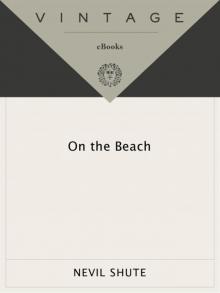 On the Beach
On the Beach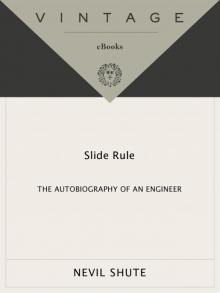 Slide Rule
Slide Rule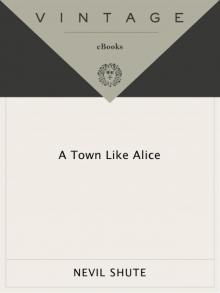 A Town Like Alice
A Town Like Alice The Far Country
The Far Country Pied Piper
Pied Piper Round the Bend
Round the Bend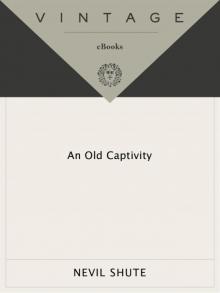 An Old Captivity
An Old Captivity Mysterious Aviator
Mysterious Aviator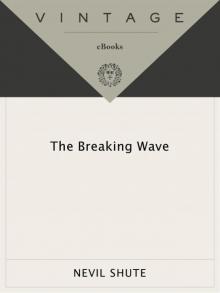 The Breaking Wave
The Breaking Wave Marazan
Marazan Lonely Road
Lonely Road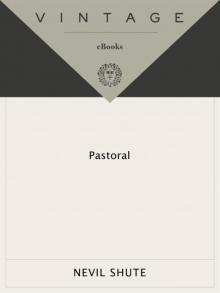 Pastoral
Pastoral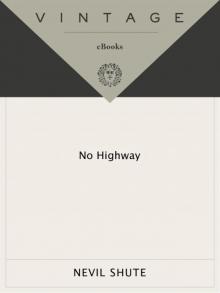 No Highway
No Highway Stephen Morris and Pilotage
Stephen Morris and Pilotage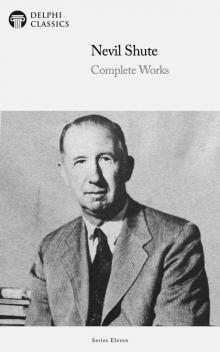 Complete Works of Nevil Shute
Complete Works of Nevil Shute Most Secret
Most Secret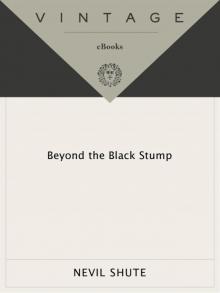 Beyond the Black Stump
Beyond the Black Stump The Rainbow and the Rose
The Rainbow and the Rose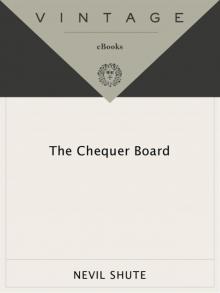 The Chequer Board
The Chequer Board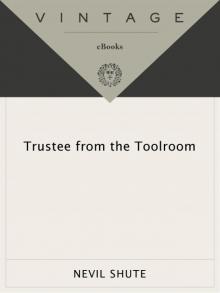 Trustee From the Toolroom
Trustee From the Toolroom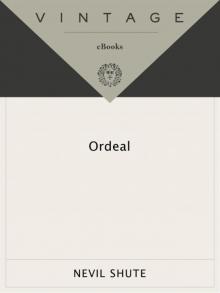 Ordeal
Ordeal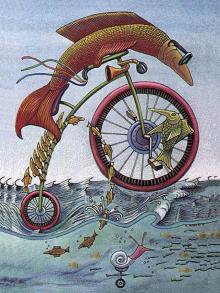 Stephen Morris
Stephen Morris